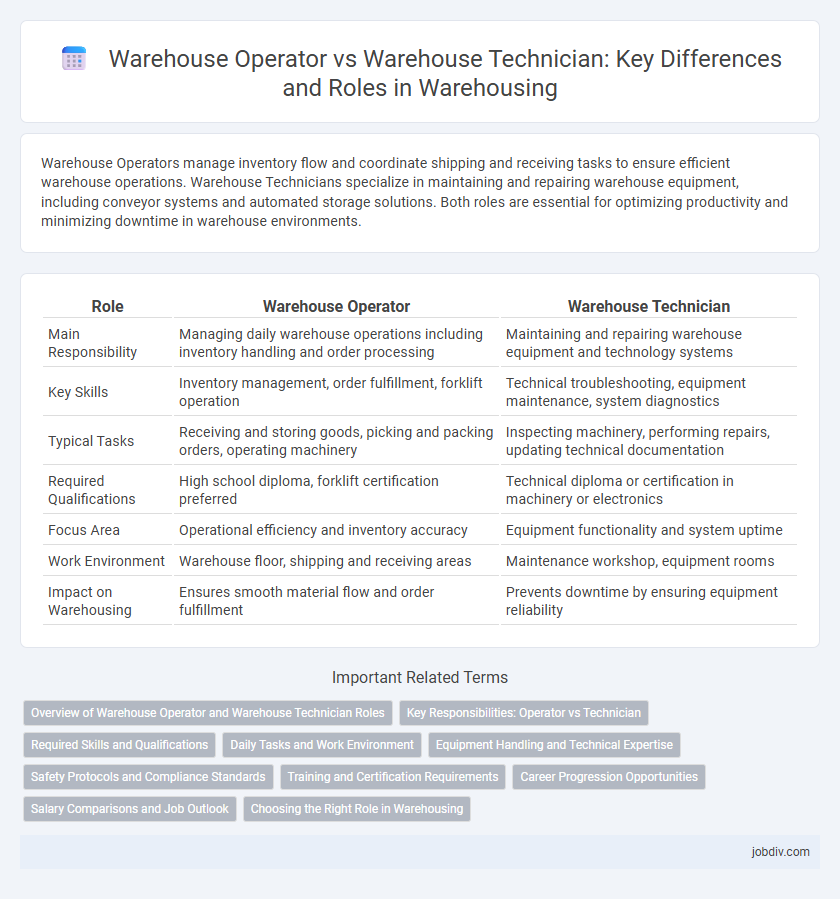Warehouse Operators manage inventory flow and coordinate shipping and receiving tasks to ensure efficient warehouse operations. Warehouse Technicians specialize in maintaining and repairing warehouse equipment, including conveyor systems and automated storage solutions. Both roles are essential for optimizing productivity and minimizing downtime in warehouse environments.
Table of Comparison
| Role | Warehouse Operator | Warehouse Technician |
|---|---|---|
| Main Responsibility | Managing daily warehouse operations including inventory handling and order processing | Maintaining and repairing warehouse equipment and technology systems |
| Key Skills | Inventory management, order fulfillment, forklift operation | Technical troubleshooting, equipment maintenance, system diagnostics |
| Typical Tasks | Receiving and storing goods, picking and packing orders, operating machinery | Inspecting machinery, performing repairs, updating technical documentation |
| Required Qualifications | High school diploma, forklift certification preferred | Technical diploma or certification in machinery or electronics |
| Focus Area | Operational efficiency and inventory accuracy | Equipment functionality and system uptime |
| Work Environment | Warehouse floor, shipping and receiving areas | Maintenance workshop, equipment rooms |
| Impact on Warehousing | Ensures smooth material flow and order fulfillment | Prevents downtime by ensuring equipment reliability |
Overview of Warehouse Operator and Warehouse Technician Roles
Warehouse Operators manage inventory flow, oversee shipment processes, and ensure accurate order fulfillment within storage facilities. Warehouse Technicians focus on equipment maintenance, repair, and technical support to optimize warehouse operations and safety. Both roles are crucial for operational efficiency, with Operators handling logistics and Technicians addressing technical functionality.
Key Responsibilities: Operator vs Technician
Warehouse Operators focus on inventory management, order picking, packing, and ensuring efficient material flow within the warehouse. Warehouse Technicians specialize in maintaining and repairing warehouse equipment, troubleshooting system issues, and supporting automated machinery to minimize downtime. Both roles are essential for streamlined warehouse operations, with Operators handling day-to-day logistics and Technicians ensuring operational reliability and equipment functionality.
Required Skills and Qualifications
Warehouse Operators require strong organizational skills, basic inventory management knowledge, and the ability to operate forklifts and pallet jacks safely. Warehouse Technicians need advanced technical expertise in equipment maintenance, troubleshooting, and repair, often requiring certifications in machinery or electrical systems. Both roles demand attention to detail, physical stamina, and adherence to safety protocols, with Warehouse Technicians emphasizing mechanical proficiency and Warehouse Operators focusing on operational efficiency.
Daily Tasks and Work Environment
Warehouse Operators manage inventory flow, operate material handling equipment, and ensure timely order fulfillment in a fast-paced environment. Warehouse Technicians focus on maintaining and repairing warehouse machinery, troubleshooting technical issues, and optimizing equipment performance to minimize downtime. Both roles require adherence to safety protocols and collaboration in a dynamic, physically demanding warehouse setting.
Equipment Handling and Technical Expertise
Warehouse Operators primarily focus on the efficient handling and movement of equipment such as forklifts, pallet jacks, and conveyor systems, ensuring safe and timely processing of goods. Warehouse Technicians possess advanced technical expertise, maintaining, troubleshooting, and repairing warehouse machinery and automated systems to optimize operational uptime. The distinction lies in Operators managing equipment use, while Technicians address in-depth mechanical and electronic issues within the warehousing environment.
Safety Protocols and Compliance Standards
Warehouse Operators ensure safety protocols are rigorously followed by conducting regular inspections and maintaining organized storage to prevent accidents. Warehouse Technicians focus on compliance standards by calibrating equipment and implementing safety measures in line with OSHA regulations and industry guidelines. Both roles collaborate to uphold a secure work environment, minimizing risks and enhancing operational efficiency.
Training and Certification Requirements
Warehouse operators typically require basic training in inventory management, safety protocols, and equipment operation, with certifications such as OSHA forklift certification often preferred for compliance and safety. Warehouse technicians need advanced technical training in equipment maintenance, troubleshooting, and systems management, often holding specialized certifications like Certified Maintenance & Reliability Technician (CMRT) or technical diplomas. Both roles emphasize ongoing training to stay current with evolving warehouse technologies and safety standards.
Career Progression Opportunities
Warehouse operators typically manage day-to-day inventory handling, receiving, and shipping tasks, providing a foundation for advancing into supervisory or logistics coordinator roles. Warehouse technicians, equipped with specialized technical skills in equipment maintenance and automated systems, often progress toward maintenance management or automation specialist positions. Pursuing certifications in supply chain management or industrial maintenance can significantly enhance career advancement prospects in both paths.
Salary Comparisons and Job Outlook
Warehouse operators typically manage inventory control and oversee daily warehouse operations, earning an average salary ranging from $35,000 to $50,000 annually. Warehouse technicians, responsible for equipment maintenance and technical support within the facility, often command slightly higher salaries between $40,000 and $55,000 per year due to specialized skills. Job outlook for both roles is positive, with warehouse operators experiencing steady demand driven by e-commerce growth and warehouse technicians benefiting from increasing automation and the need for technical expertise.
Choosing the Right Role in Warehousing
Warehouse operators oversee inventory management, coordinate shipping and receiving processes, and ensure compliance with safety regulations, making them ideal for candidates with strong organizational and leadership skills. Warehouse technicians focus on equipment maintenance, troubleshooting, and repair, suited for individuals with technical expertise and hands-on problem-solving abilities. Choosing the right role depends on whether the emphasis is on operational oversight or technical support within the warehousing environment.
Warehouse Operator vs Warehouse Technician Infographic

 jobdiv.com
jobdiv.com